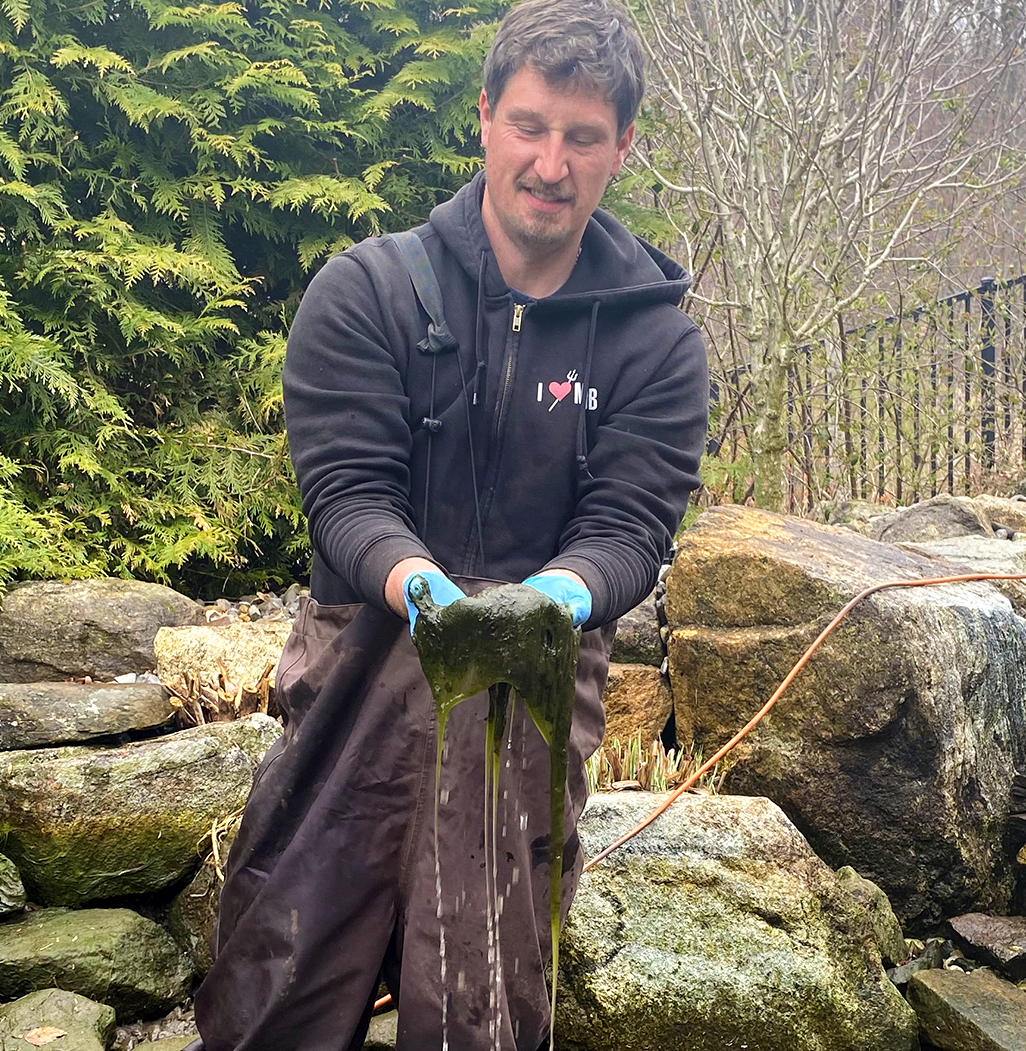
Spring Algae Prevention: How to Keep Your New Jersey Pond Clear
As spring arrives, so does the unwanted return of algae in ponds across New Jersey. Warmer temperatures and increased sunlight create the perfect conditions for algae blooms, leading to murky water, unpleasant odors, and unhealthy conditions for fish and plants. The good news? With the right New Jersey pond algae prevention strategies, you can keep your water clear and balanced all season long.
Here’s how to prevent spring algae growth before it takes over your pond.
1. Remove Debris & Perform a Spring Cleaning
Winter can leave behind decaying leaves, sludge, and organic waste, all of which feed algae. A thorough spring cleaning is the first step to keeping your New Jersey pond algae-free.
✅ Skim out leaves, twigs, and debris with a pond net.
✅ Use a pond vacuum to remove sludge buildup at the bottom.
✅ Trim dead plant material around and in the pond.
✅ Perform a partial water change (about 10-20%) to refresh the system.
By eliminating excess nutrients early, you cut off algae’s main food source before it becomes a problem.
2. Add More Aquatic Plants for Natural Balance
Plants are nature’s best defense against algae! They absorb excess nutrients, provide shade, and compete with algae for resources.
🌿 Floating plants (like water lettuce or water lilies) block sunlight, reducing algae growth.
🌿 Submerged plants (like anacharis or hornwort) oxygenate the water and help filter out waste.
🌿 Marginal plants (like irises or cattails) absorb excess nutrients from the edges of your pond.
A well-planted pond naturally maintains clear water and keeps algae in check.
3. Optimize Your Filtration System
A properly functioning filter and pump help maintain clear, well-circulated water, making it harder for algae to thrive.
🔍 Clean your filter media to ensure it’s free of sludge buildup.
🔍 Check that your pump is running efficiently to maintain strong water movement.
🔍 Consider a UV clarifier, which helps kill free-floating algae before it turns into green water.
Poor water circulation creates stagnant areas where algae thrives—so keep that water moving!
4. Introduce Beneficial Bacteria
Beneficial bacteria naturally break down organic waste, preventing nutrient overload in your pond. Adding them in early spring helps establish a healthy ecosystem.
💧 Use a high-quality beneficial bacteria treatment formulated for ponds.
💧 Apply it consistently—especially after water changes or heavy rains.
💧 Avoid over-cleaning your pond, which can remove beneficial bacteria along with debris.
This natural solution reduces the risk of algae blooms while keeping your pond’s ecosystem balanced.
5. Limit Direct Sunlight Exposure
Sunlight is one of the biggest factors in algae growth. While plants help provide shade, there are additional ways to reduce excessive sunlight exposure:
☀️ Use pond dye to naturally tint the water and block some sunlight.
☀️ Install a floating fountain to create ripples, reducing light penetration.
☀️ Place rocks or hardscaping around your pond to provide extra shading.
By managing sunlight exposure, you slow down algae growth before it starts.
6. Avoid Overfeeding Your Fish
Excess fish food leads to uneaten waste, which releases nutrients that fuel algae blooms.
🐟 Feed only what your fish can consume in 2-3 minutes.
🐟 Use high-quality fish food that produces less waste.
🐟 Remove uneaten food to prevent it from decaying in the water.
Keeping a balanced fish population and avoiding overfeeding will help control algae naturally.
7. Be Proactive with Algae Treatments
If algae still appears, pond-safe treatments can help control the problem before it spreads.
🦠 Beneficial bacteria treatments naturally outcompete algae.
💦 Barley straw or barley extract slowly releases compounds that prevent algae growth.
⚡ UV clarifiers destroy free-floating algae, preventing green water.
Always choose eco-friendly, fish-safe solutions to protect your pond’s ecosystem.
Don’t wait until it’s too late to book your spot. Contact Atlantis Water Gardens today or give us a call at 973-627-0515 to schedule your winter consultation. Let us help you with your spring cleanouts and maintenance!
FAQ: Spring Algae Prevention: How to Keep Your New Jersey Pond Clear
Does adding a fountain help control algae in Passaic County, NJ?
Yes! A fountain in Passaic County improves water circulation, preventing stagnant areas where algae thrive.
Should I consider adding barley straw to my pond in Mendham, NJ?
Yes! Barley straw in Mendham is a natural algae deterrent that keeps your pond water clear.
Is adding an aerator beneficial for controlling algae in Randolph, NJ?
Definitely! An aerator in Randolph increases oxygen levels, which helps beneficial bacteria break down waste.
How does adding more submerged plants help prevent algae growth in Livingston, NJ?
Submerged plants in Livingston absorb excess nutrients that would otherwise feed
Discover more winter tips, tricks and information located on our learning hub at Atlantis Water Gardens!
Check out these blogs:
How Do Seasonal Changes Affect Water Features?